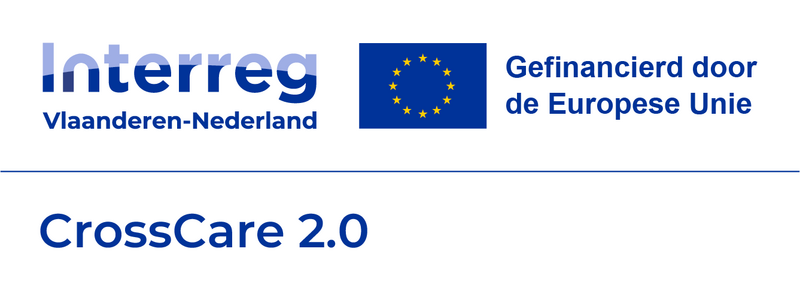CrossCare 2.0
CrossCare 2.0 is a large-scale European program in which eight Flemish and Dutch care living labs provide financial and substantive support for the development of new care innovations in Flanders and the Netherlands.

This project is made possible by the support of Interreg Flanders-Netherlands, VLAIO - Flanders Innovation & Entrepreneurship and Province of East Flanders.


Odisee provides within CrossCare 2.0 the impact measurement and evaluation of care innovation trajectories, the care trial garden service and the global CrossCare 2.0 trajectory. We want to strive for a more scientific and substantiated way to map the potential and effective impact of care innovations. Evidence-based measurement tools will be used to quantify, assess and compare their intended and ultimately realized impact. We take into account relevant parameters at the economic, social and ecological levels. Meet the problem definition around which this project is set up and how we will work on it with 8 different partners from Flanders and the Netherlands over the next two years.

Innovation as a possible response to growing social care demands and needs
Care questions and needs in Dutch and Flemish society are becoming increasingly numerous, diverse and complex. Social and demographic developments such as the aging population, the emergence of complex long-term care and support processes, the higher expectations and demands of care users, etc. play an important role in this and are noticeable on both sides of the border. In addition, the growing shortage of personnel in the broad sector of "care and welfare" is also one of the major challenges on the labor market. The organization, accessibility and affordability of the healthcare system are coming under pressure. In this sense, the successful development and implementation of care innovations can offer possible answers on various fronts to the many challenges facing the sector.
Complex innovation processes in a fragmented and hard-to-access marketplace
We note that innovation processes in the concrete health and welfare sector are often still laborious and/or limited in their development, implementation and/or scaling up. It is well known that many innovative ideas never reach the market effectively. Innovators/developers sometimes have little connection to the sector and/or often collide with various obstacles in the sector (fragmented market, complex protocols and rules, etc.). The market introduction of many technological innovations also fails mainly because they are insufficiently attuned to end users' needs and behaviors or do not sufficiently fit into services, processes, structures or existing business models of health and welfare organizations.
Care trial gardens' input as catalysts and bridge builders
It is within that context, of healthcare innovations that have a difficult market introduction, that the added value of healthcare trial gardens must be situated. Innovation has a price tag and so an adequate and efficient innovation strategy is not a luxury. To ensure that an innovation lands well in healthcare practice, it is important to know the healthcare landscape well, to know which parties and actors play a role in it and what their interests, wishes and needs are. Care living labs can play an important role in this and create a better connection between technology, society and economy by bridging the gap between the technological development of products and services on the one hand and the needs, preferences and requirements of care end-users on the other. In particular, a care living lab guides developers of care innovations to create, together with end users, new or improved care concepts, services, processes and products and to test them in practice. The end user (a patient, a client, a citizen, a healthcare professional, ...) is therefore not only central in these processes for evaluation, but also in the development, elaboration and adjustment of the care innovations.
Role Odisee University College
Odisee University College will include impact measurement and evaluation from two of its research centers, Care Innovation ("Zinn") and Center for Sustainable Entrepreneurship ("CenSe"). In doing so, the final objective of our work package is threefold. First, the work package aims to identify the effectiveness and impact of innovation pathways. The intention is that we not only test this substantiated impact prognosis of the innovation paths post factum in the evaluation, but also actively integrate it and take it into consideration during the selection and evaluation procedure. In addition, this work package also wants to further investigate and document the effects of the care trial garden service and of the global CrossCare 2.0 program. We thus want to try to map the cross-border impact of the global project as an accelerator of innovation (for participating parties, stakeholders, end users as well as society as a whole).
Project partners
Flanders: LiCalab/Thomas More Kempen (province of Antwerp), Zorglab Aalst (province of East Flanders), Happy Aging (province of Flemish Brabant & Limburg) and Eerstelijnszone Brugge in collaboration with POM-West Flanders (province of West Flanders).
The Netherlands: Care Innovation Center (North Brabant province), Zuyd Hogeschool/EIZT (Limburg province), Coöperatie Slimmer Leven in collaboration with Brainport Development (North Brabant province) and HZ University of Applied Sciences (Zeeland province).



